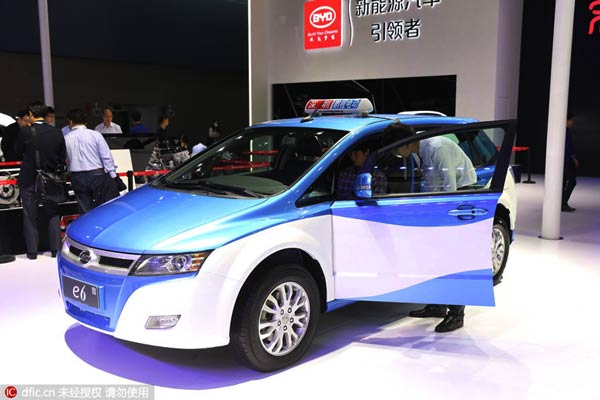BYD's EVs set to green Singapore
 |
|
Visitors try out BYD e6 at the 13th China (Guangzhou) International Automobile Exhibition, also known as Auto Guangzhou 2015, in Guangzhou city, South China's Guangdong province, Nov 21, 2015. [Photo/IC] |
HDT will begin its e6 taxi service in the first week of September, with all 100 units being progressively introduced until the first quarter of 2017, the e-carmaker said.
HDT has been operating a private-hire service with an existing fleet of 30 BYD e6 units since 2014, which will continue to provide on-call and leasing services.
HDT's e-taxi trial is also part of Singapore's EV Phase 2 Test. The HDT e-taxi service will operate for eight years.
"With its strong research capabilities, great pool of talent and a growing electro-mobility ecosystem, Singapore is an ideal location to deploy our e-taxi fleet to conduct research and development with reputable partners," said Wang Chuanfu, chairman of BYD Group.
Wang said he hopes to co-create new and innovative solutions that can be commercialized first in Singapore and later in other countries in the region.
Seeing Singapore's leading position in finance, technology, culture, and its location in Southeast Asia, as well as strong commitment to environmental preservation, BYD considers the country a key market in the region.
The e-carmaker said it plans to establish its Southeast Asian regional headquarters and research and development center in Singapore, but did not indicate a time frame.
"It depends on the market, so we can't decide when to build them," said a public relations executive of BYD, adding the company now is discussing the idea with the Singaporean government.
Singapore issues a limited number of vehicle licenses every year and applicants could get one in a bi-weekly auction. The license price varies according to vehicle emissions and type.
"In Singapore, buying a vehicle is like buying a house, it is too expensive", said Amanda Hao, 33, a Singaporean resident, who is curious why the government seems not very active on encouraging new energy vehicles or NEVs.
According to her, a license for vehicles with engines under 1600cc costs about $37,600, while a license for vehicles with engines above 1600cc would cost about $42,100. But licenses for vans and buses are cheaper at $33,800.
Founded in 1995 as a battery maker, BYD is now a new energy solution provider with businesses covering four industries: IT, cars, new-energy vehicles and light rail systems.
Listed on both the Hong Kong bourse and the Shenzhen Stock Exchange, BYD said it aims to sell 150,000 NEVs worldwide this year. Last year, it sold 70,000 NEVs across the world, up more than 200 percent year-on-year.
The company has 24 production bases in China, one in the United States and one in Brazil. Its NEVs have been sold in 48 countries and regions.



 Print
Print Mail
Mail

